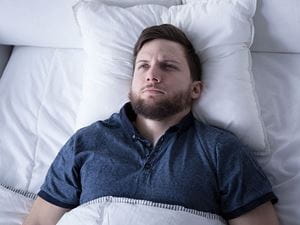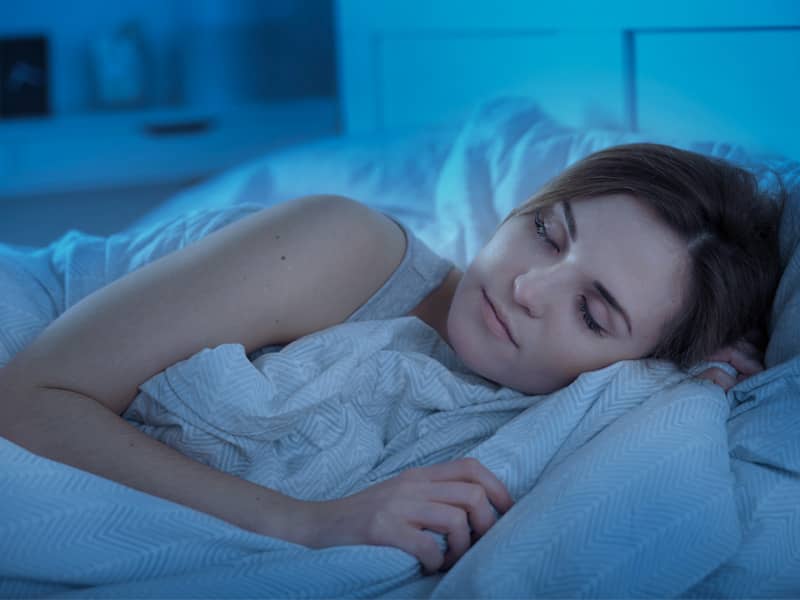
Shutterstock.com
Culture is not the only thing to blame for the West’s lack of sleep. Many ordinary, everyday habits have a terrible effect on a person’s sleep. Here are five ways you are wrecking your sleep.
Afternoon Caffeine
A person’s circadian rhythm hits a natural low-point around 2:00 p.m. to 4:00 p.m. This is why most people find themselves feeling tired or unfocused after lunch. In response to this drop in energy levels, it is common for people to drink a cup of coffee or a soda. The caffeine in these drinks does help a person push past that natural energy slump, but that afternoon pick-me-up will haunt a person at night.Caffeine stays in a person’s system for around nine hours. This does not mean that a person is just as energized and wide awake at hour eight as hour two. It does mean, however, that a person will be unlikely to fall asleep until after all the caffeine has left their system. Even trace amounts of caffeine can keep a person from a restful night’s sleep.
Some people are more sensitive to caffeine than others. Being sensitive to caffeine does not necessarily mean that a person is bouncing off the walls after one cup of coffee. Many people show no obvious signs that that are extremely sensitive to caffeine. For these people, however, caffeine can continue to keep them awake for 10 or even 12 hours after they finish that soda. So, if someone drinks a soda at 3:00 p.m., they will not be able to get to a rejuvenating stage of sleep until at least midnight. If that person is sensitive to caffeine, they could be at least semi-awake until 3:00 a.m.
A healthy alternative to caffeine is herbal peppermint tea. The smell and taste of peppermint are known to increase a person’s energy and their mental focus. Citrus fruits such as lemons or oranges have a similar effect. So, skip the coffee tomorrow afternoon and eat a clementine instead.
Electronics at Night
Many people today seem to have become surgically attached to their phones. They can’t go anywhere without their phone. It is the first thing they touch in the morning and the last thing they hold before they go to bed. This is somewhat unsurprising since smartphones are many people’s first choice of entertainment. Scrolling through Facebook in bed, however, can cost a person sleep and not just because they find a new post they absolutely have to comment on.The screens in smartphones, tablets, laptops and desktop computers all emit blue light. This is part of why they are so bright. That brightness is helpful for reading the screen in a dark bedroom, but it wreaks havoc on a person’s circadian rhythm. The body’s internal clock is based on light and dark. When a person stares at a computer screen late at night, that bright light tells the body that it is morning. As a result, the body begins to think that 11:00 p.m. is morning and a good time to be awake.
The blue light emitted by electronics screens does not just reset the circadian rhythm. Scientists are not entirely sure why, but blue light suppresses melatonin production. Without the right levels of melatonin, a person can’t fall or stay asleep. In fact, an under- or overproduction of melatonin is classified as a medical sleep disorder.
Varied Sleep-Wake Times
Perhaps the most persistent sleep myth is the idea that a person can make up for lost sleep on the weekends. This belief is not only false, it is damaging. A person who has variable sleep and wake times is going to have a baffled circadian rhythm. Their body is not going to know what is morning and what is night. Sleeping in on the weekends, then, makes it even harder to sleep during the week. This leads to a person missing even more sleep during the week and sleeping in even later on the weekend. It becomes a vicious cycle and a difficult one to break.No one really wants to hear it, but to keep a healthy circadian rhythm it is best to have sleep and wake times that do not vary by more than an hour. So, a person who gets up at 6:00 a.m. during the week should not be sleeping in later than 7:00 a.m. on the weekends. It is an unpleasant thought to many people, but it will result in better sleep during the week and leave a person without the need to sleep in on the weekends to make up for lost rest.
Skipping Breakfast
A sleep debt makes it difficult to get up in the morning. This tends to leave a person sleeping in until the last possible moment and then scrambling to get to work on time. In an effort to save time, plenty of people skip breakfast. Skipping breakfast leaves a person hungry, irritable and low on energy in the morning, and it also has a negative effect on sleep. The body’s circadian rhythm is based largely on light exposure, but it is also influenced by eating habits. A long period between meals registers as “night” for the body. The first thing eaten after that long period is then marked as “morning.” If a person skips breakfast and does not eat until lunch, their body may start to think that noon is actually morning. This leaves the body slowly shifting sleep-wake times accordingly. Soon, the body thinks that bedtime is at 4:00 a.m. and sunrise or morning is at noon.A similar problem occurs if a person has a midnight snack. That late hour is tagged as “morning” and repeated late night trips to the fridge can leave a person’s body primed to consistently awaken at 3:00 a.m.
Nightcap
Some people like to have a glass of wine or shot of whisky before bed. They feel this helps them fall asleep faster. While they are not quite wrong, they are missing a large piece of the puzzle. Alcohol can help a person fall asleep faster, but it will deny a person restful sleep. Alcohol is known to interfere with slow-wave sleep patterns called delta activity. Delta activity is the period in sleep that allows for memory formation and learning. Alcohol will also block R.E.M. sleep which is the most restorative period of a person’s sleep. In addition, a nightcap can lead to an increase in alpha activity, the sort of brain activity that occurs when a person is awake but relaxing, and relax the muscles in a person’s throat which leaves a person more prone to instances of sleep apnea. Sleep apnea is when a person briefly stops breathing while they are asleep. The occasional bout of sleep apnea is normal, but in some people these brief episodes happen consistently or for long enough to deny the body enough air to wake the person. In these cases, sleep apnea has gone from a normal, occasional event to a potentially serious sleep disorder.Sleep is too important to sacrifice on the altar of bad habits. Thankfully, many habits that are bad for sleep are not too difficult to change. Take fruit to work instead of an extra cup of coffee and train yourself not to sleep in on Saturday morning. It may not be pleasant to reset your circadian rhythm, but the resulting restful, rejuvenating sleep is worth it.

